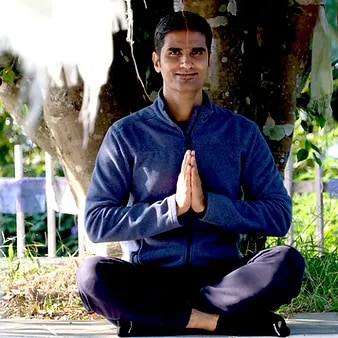Mahavir Jayanti: A Yogic Perspective on Non-Violence and Self-Discipline
by Hardik Mehta

Mahavir Jayanti, the auspicious birth anniversary of Lord Mahavira, holds profound spiritual significance for Jains and seekers of truth. Lord Mahavira, the 24th Tirthankara of Jainism, emphasized the principles of Ahimsa (non-violence), Satya (truth), Asteya (non-stealing), Brahmacharya (celibacy), and Aparigraha (non-possessiveness)—ideals that deeply resonate with the philosophy of yoga.
Yoga, like Jainism, advocates self-discipline, mindfulness, and inner transformation. This blog explores the connection between Mahavir Jayanti and yoga, shedding light on how yogic practices align with Mahavira’s teachings for holistic well-being.
The Teachings of Lord Mahavira and Their Yogic Relevance
- Ahimsa (Non-Violence) and Yoga
Ahimsa is the foundation of Jainism and a key principle of yoga. Patanjali’s Yoga Sutras list Ahimsa as the first yama (ethical discipline), emphasizing kindness towards all beings. Practicing Ahimsa in yoga involves:
- Mindful Communication: Speaking words that cause no harm.
- Ahimsa in Diet: Choosing a plant-based, sattvic diet.
- Non-Violent Thoughts: Cultivating compassion through meditation.
- Satya (Truthfulness) and Yoga
Satya, or truthfulness, is another core principle of Jainism and yoga. Practicing Satya through yoga involves:
- Self-Inquiry Meditation: Observing thoughts without bias.
- Honest Living: Aligning actions with integrity.
- Mindfulness Practices: Cultivating awareness to live truthfully.
- Aparigraha (Non-Possessiveness) and Simplicity in Yoga
Aparigraha, or non-attachment, is essential in both Jainism and yoga. Yogic philosophy teaches contentment (Santosha), encouraging a minimalistic and mindful lifestyle. Practices include:
- Decluttering the Mind: Letting go of unnecessary thoughts.
- Practicing Gratitude: Finding joy in simplicity.
- Detachment from Materialism: Focusing on inner wealth.
Yogic Practices to Honor Mahavir Jayanti
- Asanas (Postures) for Self-Discipline
Yoga asanas instill discipline, control, and awareness—values Mahavira exemplified. Beneficial asanas include:
- Vrikshasana (Tree Pose): Symbolizes stability and grounding.
- Padmasana (Lotus Pose): Encourages deep meditation and stillness.
- Gomukhasana (Cow Face Pose): Opens the heart center, promoting compassion.
- Pranayama (Breath Control) for Inner Peace
Mahavira practiced deep self-awareness, a state that can be cultivated through the practice of pranayama. Effective techniques include:
- Anulom Vilom (Alternate Nostril Breathing): Balances energy and emotions.
- Bhramari (Humming Bee Breath): Induces a meditative state and reduces stress.
- Meditation on Ahimsa
Meditation helps cultivate inner peace and non-violence. Practicing Metta (Loving-Kindness Meditation) on Mahavir Jayanti can enhance feelings of love and forgiveness.
- Mantra Chanting for Spiritual Awakening
Chanting Jain and yogic mantras helps attune the mind to higher consciousness. Reciting “Om Hreem Arham Namah” invokes inner purity and divine connection.
Fasting and Yogic Detox on Mahavir Jayanti
Fasting is a significant practice in Jainism and yoga. It detoxifies the body and strengthens willpower. Observing a sattvic fast (fruit, nuts, and herbal drinks) on Mahavir Jayanti aligns with yogic principles of self-purification (Shaucha).
Integrating Mahavira’s Teachings into Daily Yoga Practice
- Practice Ahimsa Daily: Be mindful of thoughts, words, and actions.
- Meditate on Compassion: Cultivate empathy for all living beings.
- Live Simply: Reduce unnecessary desires and attachments.
- Engage in Seva (Selfless Service): Contribute to society without expectations.
Conclusion: Embodying Mahavira’s Teachings Through Yoga
Mahavir Jayanti is not just a celebration but an invitation to live with greater mindfulness and self-discipline. By integrating Jain principles with yoga, one can cultivate inner peace, ethical living, and spiritual growth.
Sayujya Yoga – The Best Yoga Institute in Mumbai
If you seek to deepen your yogic journey, Sayujya Yoga in Mumbai offers the best 200 Hours Yoga Teacher Training Course (TTC) and specialized programs, including Ashtanga Vinyasa and Yin Yoga TTC. Whether you’re looking for Yoga classes in Ghatkopar East or a Yoga Alliance-certified course in Mumbai, Sayujya Yoga provides authentic and in-depth training. Join us to experience yoga as a path to self-transformation and well-being.
About the Author

Hardik Mehta
Hardik is an E-RYT 500 & YACEP (Yoga Alliance Continuing Education Provider), Yoga Alliance, USA. He has been practicing yoga for the last 9 years. Prior to finding his true calling in Yoga, he was working with various corporates for 12 years in the Retail and eCommerce sector.
